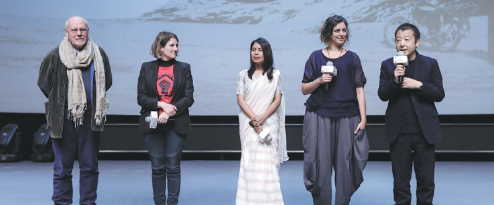News
Small and significant
Updated:2019-10-24 10:23By Xu Fan ( China Daily)

With filmmaker Jia Zhangke (left) as the host, director Zhang Yimou takes a retrospective view of his major movies in a master class on Oct 11, during the 3rd Pingyao Crouching Tiger Hidden Dragon International Film Festival. [Photos provided to China Daily]
It might not be the biggest cinema jamboree in China, but the influence of Pingyao's Crouching Tiger Hidden Dragon festival is growing, Xu Fan reports.
For many, Pingyao - a small town in Shanxi province - is most notable for the historical attractions, some dating back 2,700 years, that are dotted about the area.
However, a probably lesser-known fact is that it is also China's most cinemaloving locale. The town, which has a population of just over 520,000, saw its annual box office haul surge 550 percent year-on-year in 2018.
Director Jia Zhangke says he was stunned to hear that figure when somebody working for Maoyan - the country's largest movie ticket service - called him and told him that the company wanted to list Pingyao as China's top town for moviegoers.
For Jia, a Shanxi native whose films have mostly turned the lens on people living in the province, the number exemplifies the painstaking effort he has put into the Pingyao Crouching Tiger Hidden Dragon International Film Festival, an annual event he founded in 2017.
Recently concluding its third edition, the festival showed 54 films from 27 countries and regions from Oct 10 to Saturday, attracting more than 200,000 visitors.
All the films were shown on the Chinese mainland for the first time, with nearly 56 percent of them making their global debut and 75 percent being Asian premieres.
Despite screening around one-tenth the number of films usually shown at bigger domestic international film festivals, such as those in Shanghai and Beijing, Jia says the Pingyao event will attempt to preserve its charm by maintaining its current scale.
"We decided at the very beginning that it should be a small-scale yet high-quality and easygoing festival, which mostly screens non-Western films, such as those from Eastern Europe, South America, Asia and Africa," notes the auteur, who is perhaps best known for specializing in arthouse movies.
He explains that such films - rarely seen in Chinese mainland theaters - make up an important part of the modern cinema landscape, displaying a diversity of culture.
"That's what I really like to see - people from different backgrounds, who love cinema, encountering each other on their way to theaters; the viewing rooms are filled with a diverse audience, and the atmosphere is quiet and comfortable," says Jia.
All of the activities, ranging from the film screenings to master classes, are all held at Pingyao Festival Palace, a diesel factory-turned-entertainment complex located in the northwestern corner of the Ancient City of Pingyao, a UNESCO world heritage site.

Jia Zhangke (right) alongside Marco Muller (left), the festival's artistic director, and creators behind the latest BRICS coproduction The Neighbors exchange views with the audience after a screening in Pingyao, Shanxi province, on Oct 17. [Photos provided to China Daily]
Unlike many of the bigger festivals, which are studded with box-office stars, the Pingyao festival is more like a carnival that gathers together filmmakers and ordinary fans.
When esteemed director Zhang Yimou held a master class on Oct 11, avid fans started to wait in lines since 5 am, a full five hours before the event was due to start, forcing organizers to change the original 500-seat hall to an open-air theater which can accommodate 1,500 people.
Zhang's directorial debut, Red Sorghum, a Golden Bear winner at the 1988 Berlin International Film Festival, was filmed at the Qiao Family Compound, a historic attraction located about 40-minutes drive from Pingyao.
Sitting alongside Jia, who served as the host for the master class, Zhang provided a full retrospective of all his pivotal works, as well as his latest espionage thriller Impasse and police-themed drama Jian Ru Pan Shi (As Hard as a Rock).
Somewhat surprisingly, Zhang said sincerely that he didn't dream of becoming a filmmaker, instead just hoped to lead a better life after China resumed gaokao, the college entrance exam. Luckily, he was enrolled by the Beijing Film Academy.
However, through the decades, in which he has experienced his share of ups and downs - for example there's the rarely-mentioned 1989 flop, Code Name: Cugar, and then there is his first box-office hit, 2002's Hero - Zhang admitted cinema had become a part of his life.
"Honestly speaking, many films receive very little feedback after they are released, and some stand little chance of being screened in theaters for more than one day. However, most young directors still have a fire burning in their hearts to carry on following their dreams," Zhang told the audience.
"We have many excellent young directors, but what the Chinese film industry lacks the most is good scriptwriters," he added.
Such an issue can be addressed, though, as the Pingyao Festival has attracted more and more youngsters, bringing an infusion of fresh blood to the industry. Jia says the festival has specially set up a section to gather seven prestigious academies from China and abroad to share with youngsters the knowledge of the latest technology and art trends.
Another highlight of the festival is the "made in Shanxi" section, covering films specifically shot or set in the province. Among such films shown this year was Belated Confession by local director Li Bin, about a military veteran's devotion to help villagers fight against poverty.
"Such productions can enhance local connections with the rest of the world. We hope that the festival will become an engine to drive the film and culture industries in Shanxi forward," says Jia, who now splits his time between the province and Beijing.
In addition, Jia announced that the third BRICS coproduction, The Neighbors, will be generally released in the first half of next year, and will be mainly funded by a Shanxi company.
Jia was the director of the first such coproduction and has now passed the torch to Han Yan, a 36-year-old director known for Go Away Mr Tumor, which was China's entry in the best foreign language category at the 88th Academy Awards.
Centering on the titular theme to examine the relations between people and space, the new anthology will, once again, see directors from Brazil, Russia, India, China and South Africa team up to respectively helm one of the short stories that make up the film.
"We are planning to produce the fourth BRICS coproduction next year, but it will be no longer an anthology. Instead, it will be one story told by five directors," says Jia.
Contact the writer at xufan@chinadaily.com.cn



